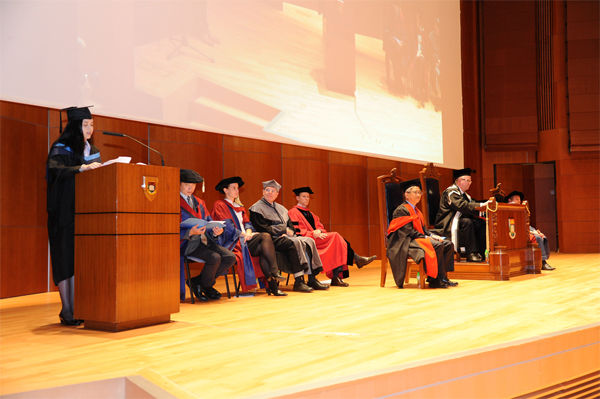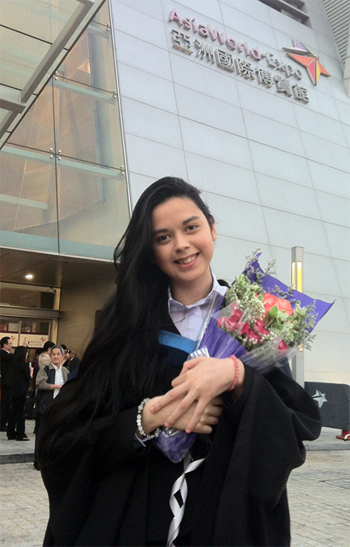Arts Faculty Vote of Thanks
By Kuldip Kaur Singh
Kuldip Kaur Singh graduated with a double major in English Studies and Fine Arts in 2013. She was on the Dean’s Honors List 2010–2013, and was awarded a Tricor Service Limited Scholarship 2011–12, the Joseph Yau Sai Man Memorial Prize in English Literature 2012, a Sir Edward Youde Memorial Scholarship for Undergraduate Students 2012-13, and the Sir Robert Kotewall Memorial Prize 2013.
Kuldip was invited to move the Vote of Thanks at the Faculty’s 2013 graduation ceremony. Here is the speech she gave.

Dear Mr. Executive Vice-President, Dean, Professor Kerr and Associate Deans, teachers, graduands, their families and guests, it’s my privilege to stand here and present a vote of thanks on this occasion. But before I can express my gratitude to the faculty, I want to go back in time. I want to retrace what’s been happening in the last few months and comprehend all of these events. We were still attending classes, walking through the Centennial Campus, and buying coffee in Starbucks not very long ago, then all of a sudden, we are all pushed along by this inexorable current of life, going our separate ways, working. The transition from university to work is easy for some, difficult for others. But everything happens so quickly in a matter of few months that we barely have time to think about it. Some people may say that there is nothing to think about. You have graduated, you have completed one phase of your life and now you are moving on to the next. Now, just move on. But I want to comprehend the meaning of all these. I do not want to just take some pretty photos here and there after this ceremony, upload them onto Facebook, then that’s it. I mean…That’s it? That’s what our last three or four years in the Arts Faculty have all come down to? I know it’s all natural and inevitable. But no. I want to pause, step back and think. I want to think about the meaning of all these. That’s what arts students should do, right? Think.
That’s what I have been thinking lately and I remember the day in early June when I submitted my last assignment, when school was officially over, and I gradually realized what was going on. I did not wake up the next morning, feeling all excited and glorious, immediately ready to embark upon a new journey. I was actually terrified, more terrified than any other days. I was out of school, out of this comfort zone, out of my sanctuary, and I have this whole life right in front of me. How do I want to see myself in 10 or 15 years? What do I want to achieve in life? What kind of a life do I want? Would I be able to make it? All these questions are exciting and liberating, but at the same time, extremely terrifying. I hope I am not the only one who felt that way back then.
Fast forward to November, to now, to this moment, the fear that I had back then has more or less subsided. I get used to things, I get used to work. I mean we are awesome, we are adaptable to anything. We are all able to get a job, able to meet deadlines after deadlines, complete one task after another, just keep going, day-in, day-out. But it’s exactly because we are so adaptable that we sometimes lose track of ourselves, we lose focus, we lose touch with our desires and dreams, or simply our own, our very own inner voice. And that’s where the Arts Faculty has come back to me, where the memories of the last three or four years learning the arts and humanities have all rushed back to remind me of one thing, one very important lesson for which I am very grateful.
No matter what your major is, like English, Fine Arts, Comparative Literature, History, Philosophy or anything. We must have all shared this same experience of spending a lot of time analyzing a piece of text, discussing among ourselves what this or that means. Why does the story make us feel that way? Or why is this painting painted in such a style? Why is this movie conveying such themes? We were always asking questions, not “how” or “what” but “why”, always discovering and rediscovering issues in an entirely new light, consistently finding and generating new meanings. When existing meanings get stagnant or static, we know it’s time to challenge, to seek further, to push, to think outside the box. That’s what makes us interesting as arts students. And that is also what I have wanted to keep doing both inside and outside the classrooms: To negotiate and re-negotiate meaning on a daily basis.
I am not sure if you are all like me, but I always consciously imagine myself as weaving a narrative, like sitting in front of a weaving machine or a loom, controlling the spins and just keeping on weaving, weaving a life story of my own. Certain little things or sensations that I experience or certain people that I encounter will be selected, combined, and woven into this narrative, expanding it, changing it, coloring it, defining it. At the end of the day, I want to generate a meaning or meanings out of this narrative, to understand and comprehend something out of it. That’s essentially what being a Bachelor of Arts student means to me personally, to always look at things and people around me in a new light, to think, to engage in a negotiation process, in order to weave a more meaningful narrative, even though that meaning is not always clear and constant.
An education in the arts and humanities is different from that of, for example, law or engineering in the sense that its effects or impact on us may not be entirely immediate or obvious. It is not vocational; you do not see how it affects you after graduation right away. If I ask what immediately comes to your mind when I say BA, all of you will certainly think of different things. Some may think of an inspiring discussion with a professor, your extremely long thesis, your humorous but very bok-jun (hardworking) classmates or even your exciting exchange in Paris, London or Nanjing. To me, the words BA can evoke some rather fragmented, unrelated memories. Off the top of my head, I remember in Year 1, there was this one time when I spent the entire night working in the 24-hour section in the Main Library with my classmate. I was working on an Art History paper, on Sandro Botticelli. (Now we actually have a painting by Sandro Botticelli in the university museum) Then it was 5 in the morning and I walked all the way back to Starr Hall, the school dormitory where I used to live. I had to tiptoe into my room because I did not want to wake up my roommate, who had just finished her basketball practice with the hall team. She should be sitting somewhere there. I also remember how we discussed the various female writers and their styles during the English class of Romanticism in Centennial Campus. I loved that class. Or that extensive paper I wrote on Renaissance prints. I am most proud of that paper. And I remember that particular fountain in Main Building, you know, that fountain with very little water spurting out. My ex-boyfriend used to wait for me there after class – these memories are not all related to studying or academia. They are not particularly exciting or dramatic. But they are all dear to my heart. They mean something to me. They are a part of me, part of my life-story, part of my narrative. BA means so much more than a university diploma or a few photos. It is already in the past, but it is still influencing me, shaping me in the present, and informing me in the future. It will be a life-long process of negotiating and re-negotiating the meaning of being a BA student, or a university student at large.
I sincerely urge every one of you to do the same. I do not want to impose my experience on you. I do not want to conclusively define what BA is, or to say BA is equal to this or that, or to say thank you Arts faculty because of a, b, and c. I was tempted to do so because it is easier that way. But no, all of you have different experiences in the faculty, with your distinctive, individual narratives, life-stories. So I urge you all to negotiate and re-negotiate the meaning of being a BA student today or beyond, to rethink how an education in arts and humanities has transformed you into who you are now, or who you will be in the future. Perhaps that is the best way, the most effective way of giving thanks to the Arts Faculty, our Alma Mater. Not through me, but through thinking and reflecting collectively.
And it does not stop at the Arts Faculty. Whenever you feel so overwhelmed or frustrated by your work that you begin to lose yourself, to lose touch with your inner voice, pause, step back and think. Think about the meaning of what you are doing, think about the meaning of everything around you. Are they what you want? Can you generate and create a better meaning or meanings out of all these, for yourself? For others? At least that’s what I have learnt as a BA student, and I have been applying it to my daily life in order to push myself. To have just a little more critical awareness about myself, my certainties and my surroundings.
Finally, we are graduating from HKU, but we are not necessarily graduating from each other. We are sharing certain collective memories and growing together as class of 2013. Because of that, I look forward to hearing how all your life-stories turn out, and I wish you all a very meaningful future ahead.
Thank you Arts Faculty. Thank you all!


Our apologies, you must be logged in to post a comment.